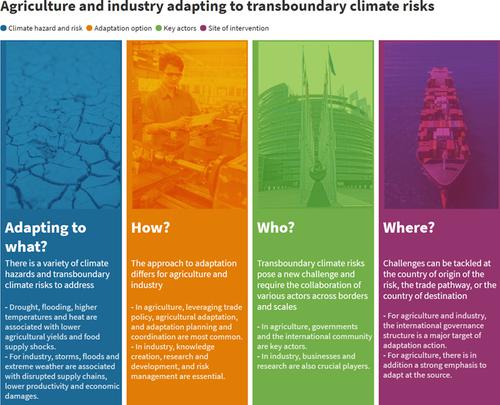当前位置:
X-MOL 学术
›
WIREs Clim. Chang.
›
论文详情
Our official English website, www.x-mol.net, welcomes your
feedback! (Note: you will need to create a separate account there.)
Adaptation to transboundary climate risks in trade: Investigating actors and strategies for an emerging challenge
WIREs Climate Change ( IF 9.4 ) Pub Date : 2022-01-31 , DOI: 10.1002/wcc.758 Birgit Bednar‐Friedl 1 , Nina Knittel 2 , Joachim Raich 2 , Kevin M. Adams 3
WIREs Climate Change ( IF 9.4 ) Pub Date : 2022-01-31 , DOI: 10.1002/wcc.758 Birgit Bednar‐Friedl 1 , Nina Knittel 2 , Joachim Raich 2 , Kevin M. Adams 3
Affiliation

|
There is growing recognition that international trade can transmit climate risks across borders, requiring new forms of and approaches to adaptation. This advanced review synthesizes knowledge on how, by whom and where adaptation actions can be taken in the agriculture and industrial sectors to reduce these transboundary climate risks (TCRs). We find a material difference in the literature on TCRs in agriculture as compared with industrial sectors. Operational and market risks, in particular reductions in food availability, dominate in agriculture, while supply chain and trade-related risks are highlighted for industry. While the origin of the risk (source) is the primary target of adaptation to agricultural TCRs, the general governance structure, such as UNFCCC and WTO deliberations, are important targets in both sectors. Adaptation at the country of destination and along the trade network is of minor importance in both sectors. Regarding the type of adaptation option, agriculture heavily relies on trade policy, agricultural adaptation, and adaptation planning and coordination, while in industry knowledge creation, research and development, and risk management are seen as essential. Governments and the international community are identified as key actors, complemented by businesses and research as critical players in industry. Some measures, such as protectionist trade policies and irrigation, are controversial as they shift risks across countries and sectors, rather than reduce them. While more research is needed, this review shows that a critical mass of evidence on adaptation to TCRs is beginning to emerge, particularly underscoring the importance of international coordination mechanisms.
中文翻译:

适应贸易中的跨界气候风险:针对新出现的挑战调查参与者和战略
人们越来越认识到,国际贸易可以跨境传播气候风险,需要新的适应形式和方法。这份高级审查综合了有关如何、由谁以及在何处在农业和工业部门采取适应行动以减少这些跨界气候风险 (TCR) 的知识。与工业部门相比,我们发现有关农业 TCR 的文献存在重大差异。运营和市场风险,特别是粮食供应减少,在农业中占主导地位,而工业的供应链和贸易相关风险则突出。虽然风险的起源(来源)是适应农业 TCR 的主要目标,但总体治理结构,如 UNFCCC 和 WTO 审议,是这两个部门的重要目标。目的地国和贸易网络沿线的适应在这两个部门都不太重要。关于适应选项的类型,农业严重依赖贸易政策、农业适应以及适应规划和协调,而在行业知识创造、研发和风险管理方面被视为必不可少。政府和国际社会被确定为关键参与者,企业和研究作为工业的关键参与者作为补充。一些措施,如保护主义贸易政策和灌溉,是有争议的,因为它们会在国家和部门之间转移风险,而不是降低风险。虽然需要更多的研究,但本综述表明,关于适应 TCR 的大量证据开始出现,
更新日期:2022-01-31
中文翻译:

适应贸易中的跨界气候风险:针对新出现的挑战调查参与者和战略
人们越来越认识到,国际贸易可以跨境传播气候风险,需要新的适应形式和方法。这份高级审查综合了有关如何、由谁以及在何处在农业和工业部门采取适应行动以减少这些跨界气候风险 (TCR) 的知识。与工业部门相比,我们发现有关农业 TCR 的文献存在重大差异。运营和市场风险,特别是粮食供应减少,在农业中占主导地位,而工业的供应链和贸易相关风险则突出。虽然风险的起源(来源)是适应农业 TCR 的主要目标,但总体治理结构,如 UNFCCC 和 WTO 审议,是这两个部门的重要目标。目的地国和贸易网络沿线的适应在这两个部门都不太重要。关于适应选项的类型,农业严重依赖贸易政策、农业适应以及适应规划和协调,而在行业知识创造、研发和风险管理方面被视为必不可少。政府和国际社会被确定为关键参与者,企业和研究作为工业的关键参与者作为补充。一些措施,如保护主义贸易政策和灌溉,是有争议的,因为它们会在国家和部门之间转移风险,而不是降低风险。虽然需要更多的研究,但本综述表明,关于适应 TCR 的大量证据开始出现,











































 京公网安备 11010802027423号
京公网安备 11010802027423号